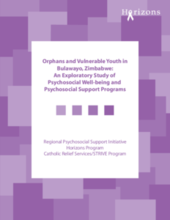Children and youth affected by AIDS typically face a wide range of stressful events and circumstances, including poverty, the loss of caregivers and loved ones, having to drop out of school, the burden of adultlike responsibilities, and social isolation. Increasingly programs for orphans and vulnerable children are addressing not only their material and educational needs, but their psychosocial needs as well. Yet there has been little research on how to evaluate psychosocial support (PSS) programs and the impact of these programs on vulnerable youth’s psychosocial well-being.
This report presents findings from an exploratory study by the Regional Psychosocial Support Initiative (REPSSI) and Catholic Relief Services’ Support to Replicable, Innovative Village/Community-level Efforts (STRIVE) Program of vulnerable youth living in and around Bulawayo, Zimbabwe. It describes their demographic characteristics, exposure to stress and trauma, and psychosocial well-being. The report also highlights the relationships between psychosocial well-being outcomes and exposure to stress and trauma, and the differences in psychosocial well-being between males and females, orphaned and nonorphaned youth, and younger and older adolescents. In addition, the report explores the relationships between exposure to different psychosocial support programs and measures of psychosocial well-being and distress. The report concludes with program and research implications.
©The Population Council, Inc.

